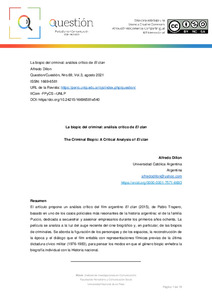Please use this identifier to cite or link to this item:
https://repositorio.uca.edu.ar/handle/123456789/12464| Título: | La biopic del criminal : análisis crítico de El clan The criminal biopic : a critical analysis of El clan |
Autor: | Dillon, Alfredo | Palabras clave: | CINE ARGENTINO; BIOPIC; BIOGRAFIAS; ESTUDIO DE CASOS; ANALISIS CINEMATOGRAFICO; CRITICA CULTURAL; Trapero, Pablo, 1971-; El clan; FILM; Robledo Puch, Carlos Eduardo, 1952- | Fecha de publicación: | 2021 | Editorial: | Universidad Nacional de La Plata. Facultad de Periodismo y Comunicación Social. Instituto de Investigaciones en Comunicación | Cita: | Dillon, A. La biopic del criminal : análisis crítico de El clan [en línea]. Question/Cuestión. 2021, 3(69). doi: 10.24215/16696581e540. Disponible en: https://repositorio.uca.edu.ar/handle/123456789/12464 | Proyecto: | El género biográfico en el cine argentino contemporáneo | Resumen: | Resumen: El artículo propone un análisis crítico del film argentino El clan (2015), de Pablo Trapero, basado en uno de los casos policiales más resonantes de la historia argentina: el de la familia Puccio, dedicada a secuestrar y asesinar empresarios durante los primeros años ochenta. La película se analiza a la luz del auge reciente del cine biográfico y, en particular, de las biopics de criminales. Se aborda la figuración de los personajes y de los espacios, la reconstrucción de la época y el diálogo que el film entabla con representaciones fílmicas previas de la última dictadura cívico militar (1976-1983), para pensar los modos en que el género biopic enhebra la biografía individual con la Historia nacional. Abstract: The article proposes a critical analysis of the Argentine film El clan (2015), by Pablo Trapero, based on one of the most resonant criminal cases in Argentine history: that of the Puccio family, dedicated to kidnapping and murdering entrepreneurs during the early 1980s. The film is analyzed in the light of the recent rise of biographical cinema and, in particular, of criminal biopics. The figuration of characters and spaces, the reconstruction of the past, and the dialogue that the film establishes with previous film representations of the last military-civic dictatorship (1976-1983) are approached, to reflect on how the biopic genre intertwines the individual biography with the national history. |
Cobertura Espacial: | Argentina | URI: | https://repositorio.uca.edu.ar/handle/123456789/12464 | ISSN: | 1669-6581 | Disciplina: | CIENCIAS SOCIALES | DOI: | 10.24215/16696581e540 | Derechos: | Acceso abierto | Fuente: | Question/Cuestión. 2021, 3 (69) |
| Appears in Collections: | Artículos |
Files in This Item:
| File | Description | Size | Format | |
|---|---|---|---|---|
| biopic-criminal-analisis.pdf | 516,4 kB | Adobe PDF |  View/Open |
Page view(s)
148
checked on Apr 27, 2024
Download(s)
831
checked on Apr 27, 2024
Google ScholarTM
Check
Altmetric
Altmetric
This item is licensed under a Creative Commons License

